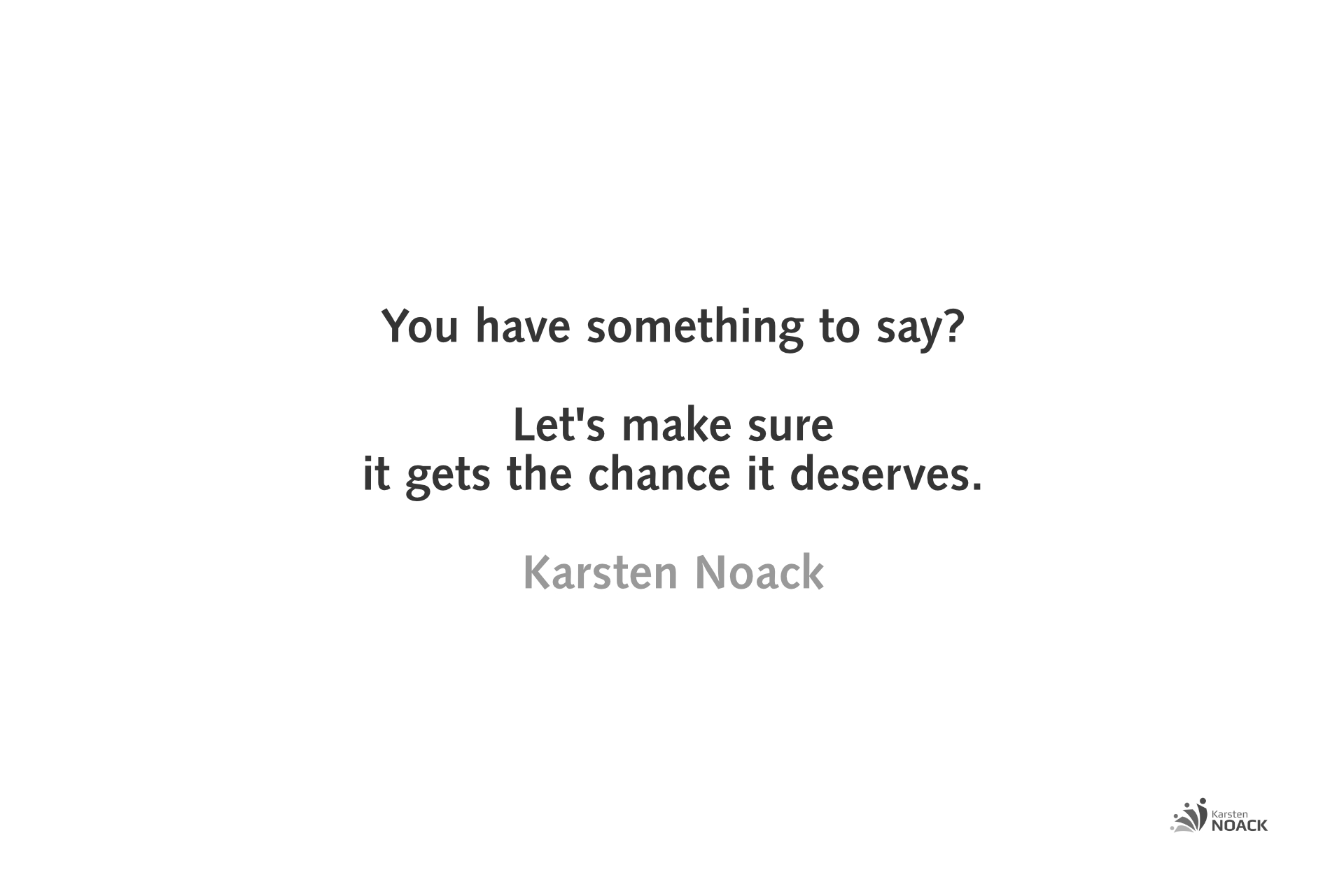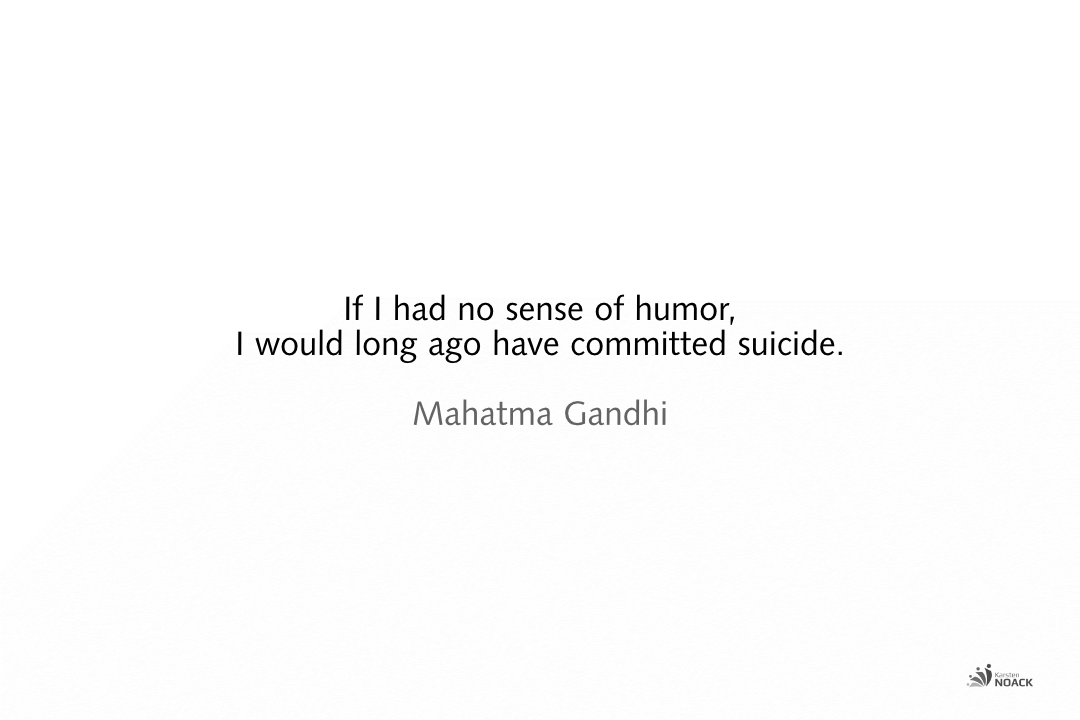20 Tips For Humor In Speeches And Presentations
Humour in speeches and presentations is good, jokes less often
Humor in speeches and presentations
Do you want the attention of your audience? Humorously move your audience before the seat hurts. Humor relaxes. It resolves tense, stressful situations. Humor has some positive effects. Appropriate humor can be used effectively in many situations. Find out what is worth paying attention to.
Overview

Humor in speeches and presentations
In speeches and presentations, it is often a matter of passing on information to the participants in an understandable way, convincing them, and asking them to act. The objectives of speeches can be quite different, but the goal of boring the audience is unlikely to be deliberately pursued. However, this often happens. With appropriate humor, it is possible to keep the audience happy, emotionalize them, and increase their attention. This way, you and your presentation will remain in good memory.
20 Tips for humor in speeches and presentations
1. Respect
Make sure you don’t insult anybody. Humor is mostly based on ambiguities, and these can annoy the audience if they are interpreted unfavorably. It’s not so much what you mean as to how the recipients interpret your words.
I don’t need to mention that jokes are not made at the expense of individuals or disadvantaged groups, do I?
2. At the beginning of your speech
Not every audience is ready for your message. Sometimes it still has to digest the impression of the previous speakers. Maybe the participants would rather be somewhere else now. Here is your chance to surprise the audience positively. Season your contribution with a pinch of humor. It is not to be underestimated – humor reduces stress. Humor awakens the desire for more.
Sometimes humor simply helps. Speeches and presentations can start well with humor. It relaxes the audience and speakers, reduces fear, and attracts attention. After an intense laugh, the brain’s reward center releases dopamine. Dopamine relaxes and gives us intense moments of happiness. It provides anticipation, i.e. the desire for more. After the laughter, the audience listens more intensively.
3. Orient on the audience
Not only does the taste changes with the audience, but also their perception, thinking, and communication style. Adapt your language to the audience. Some jokes require special education or specific vocabulary. And some audiences reject laughter as immoral in this world.
A few helpful questions:
- What are the characteristics of the audience?
- What language does it speak?
- What can the target group smile or even laugh about?
- Which humor is appropriate for the target group and which is not?
- How can one’s appearance and appearance be supported by humor in this case?
- How can these people react humorously to objections or resistance?
- Which examples, metaphors, and analogies are suitable for the audience to present the message humorously?
- What do they have in common?
- What is talked about before and after, are there humorous points of reference?
Humor is influenced by many factors, such as educational level, social status, country, origin, region, and occupational group. Use humor only if you are sure that your audience reacts positively and that it fits the message thematically.
4. Good joke tellers are rare
A very common recommendation is to start a speech with a joke. It is claimed that then you and your audience are well relaxed and ready. Seriously and no kidding: don’t start your presentation with a joke.
With the overlap of self-perception and external perception, this is such a thing. The fact is that very few people are so good at telling jokes. What looks so relaxed with the professionals of Stand-up Comedy is the result of a strict selection process, some bruises, and a lot of – very much – practice.
So once again, very clearly stated: Humor is a good way to enter into a relationship with the audience. However, not everyone is a good joke-teller. Stand-up is more challenging than it seems. If your joke fails or you make the wrong one, you’ve made a fool of yourself with part of your audience from now on. Especially since the wisdom formulated by Paul Watzlawick also applies here; the recipient decides on the message. And since jokes by definition are ambiguous (context or meaning reframing), the choice of meaning need not be in your interest.
If a horse comes into a bar.
Ask the bartender: “Why such a long face?”
5. Stand behind your messages
For an authentic performance, you must stand behind what you say. So choose only humorous elements that suit you and feel right.
6. Analogies
Analogies can help to clarify complex relationships. This can also be done very humorously if it is accompanied by a surprise.
Analogies must be recognizable by your audience so that the listener understands the parallel between the story and the actual topic. By doing this, you make your competence clear and the content accessible to your audience without taking yourself unnecessarily seriously.
7. Word games
Use the magic of language. Play skillfully with the language. Surprising definitions or double meanings of terms and acronyms are ideal for this.
Rhyme you or I eat you. What rhymes are more likely to settle in our brain convolutions and have the potential to sound like humor.
8. Irony
Irony can sometimes be used with a wink of the eye. However, this is not entirely harmless.
9. Telling a great story
Stories connect you with your audience. By bringing a scene to life through a story, listeners experience what they otherwise only intellectually understand. If you weave inappropriate humor, you can encourage even the most difficult challenges.
10. Rhymes
What rhymes is easier for us to get into our brains and has the potential to sound like humor.
11. Don’t announce humor
Surprising elements have a better effect on the audience. “It’s getting funny now”, not only seems strange, but the laughter is also more likely to get stuck in the throat. Instead, weave humor into unusual moments.
12. Short irritations awaken the audience
When the audience has been sitting passively on their chairs for hours, which they feel are flickering 1,000 PowerPoint presentations over the beamer with the neon light, then the human brain switches to draught. These are not good prerequisites for you to convince with your message. Change that!
Have courage. If you cleverly irritate your audience for a moment, they will be all the more receptive afterward. To be on the safe side, I mention that the irritation is, of course, resolved again.
13. Witty humor is more effective than admonitions
Use subtlety instead of raised index fingers. Humor is more welcome than admonitions. And with a smile, you can say a lot. Laughter is contagious. Laughter creates positive feelings.
14. Do a test run before the world premiere
Test humorous elements several times and thoroughly. And above all, ask people who have a similar sense of humor like your target audience.
15. Humor is a holistic work of art
You compete as a speaker with the offerings of the entire Internet. Those who do not carry a smartphone with them in the audience will check their fingernails at some point. Today, people get bored quickly. Not every speech can easily make such exciting offers as Netflix & Co. And yet some speeches can be fascinating and moving. Humor contributes. Also, your performance is live and therefore something special, isn’t it?
For this to succeed, I remind you about an important aspect: Humor is usually a total work of art, in which content, language, timing, and also body language, as well as voice have essential parts. Present yourself!
16. Situational comedy
Spontaneous humor has a very special effect because it requires intelligence and sovereignty on the part of the performer. Opportunities to practice such forms of humor are offered by workshops, such as Professional Quick-Wittedness: Training for the quick professional response.
17. Quality
Does a horse come into a bar and ask the bartender: “Why such a long face?
Humor is a difficult subject in itself. Finding a joke that is not only funny but also has an intellectual quality is quite a challenge.
18. Analysis: Learn from the experiences
Learn from your practical experience. Systematically evaluate your experience with humor. For several years I had provided a series of workshops with very special humor and was able to observe the effects of small changes over several dozen performances. That was very interesting and educational. The evaluation also provided me with valuable ideas for other speeches. Even if you only have one performance, evaluate it afterward. Ask for constructive feedback. And decide what you want to pay attention to in the future.
19. Undesirable side effects
Jokes or intense humor can very easily distract and then bind attention. The audience stays with the entertainment element while you are about to say something relevant. Important parts of your message are then lost. A good humorous element supports the bot.
20. Develop your style
Humor has many forms. And yes, there are good reasons to use humor as support. For example, you can start with an anecdote or a short story. An in many cases an excellent idea! By the way, you learn this in the Presentation Skills Training II and Presentation Skills Training III as group training or in individual training with me.
Preparation of important speeches and presentations
Those who do not speak are not heard, and even those who speak up are not always successful. There are a few more steps that need to be mastered.
Do you want to convince with your message and also as a personality? Then I will help you to prepare your speeches and presentations. You determine the scope. At least, I recommend a test run with professional feedback for you and your message. Then you will know how you and your content are perceived, what you should do, and what you should leave out, where there is potential. Why do you want to get such helpful feedback so late after your real performance? Then it is too late for adjustments. Benefit from the advantage. My definition of luck: Preparation meets opportunity.
You can best estimate for yourself where the effort is worthwhile concerning the expected benefit. Here you will find the fees for my support (communication, psychology, language, structure, voice, body language, storytelling, rhetorical means, media such as PowerPoint and Co., etc.)
You are not in Berlin right now? Then choose meetings with me via telephone or video support. Whereby, there are quite good reasons for a trip to Berlin.
By the way, many people suffer from such intense stage fright in front of an audience, and therefore their performance lags behind their possibilities. Too bad, because with my help performance in a good condition is possible. Just in case...
Just ask me personally
Please post any questions that may be of interest to other readers in the comments. Looking for professional help?
If you are interested in coaching, training or consulting, if you have organizational questions, or if you want to make an appointment, you can reach me best via this contact form (you can choose whether you want to enter your personal data) or via e-mail (mail@karstennoack.com). The privacy policy can be found here.
Transparency is important. That is why you will find answers to frequently asked questions already here, for example about me (profile), the services, the fees and getting to know me. If you like what you see, I look forward to working with you.
Remarks:
In the address bar of your browser, the URL should begin with "https://www.karstennoack.com/...". This indicates a secure connection (SSL). Whether you enter your real name is up to you.
A good start: Professional feedback with suggestions for improvement
How persuasive are you and your messages in speeches and presentations? How good are you at the 111+ most important presentation skills? I have been analyzing speeches since 1998. After evaluating 14,375 speeches and presentations, and numerous mistakes of my own, most of which I only discovered after a delay, I can tell you exactly what works with which audience. Let me give you the feedback that will help you get ahead. You will receive essential feedback and recommendations, as well as the impulses you need to persuade your audience in concrete situations.
Are you interested? If so, here is how to get helpful feedback with recommendations for improving your speeches and presentations.
1 Comment
Submit a Comment

Present the benefits in the beginning of your pitch
There are many strategies to consider in opening your pitch. Think about it twice, because those first minutes can make or break you.
Professional impact analysis: How are you perceived by other people?
How do you actually affect people in conversations, speeches and presentations, in interviews? Professional feedback helps. What insights does an impact analysis offer you?
17 tips for facial expressions in speeches and presentations
This article deals with what it is worth paying attention to as a speaker concerning facial expressions.
Public speaking: Keeping it simple doesn’t mean you’re stupid
One should choose the simplest explanation of a phenomenon, the one that requires the fewest leaps of logic. The more complex something is, the easier we should explain it.
Five fingers for a structured speech. Five-finger speech structure.
The five-finger speech structure step by step. Systematically build up statements, whether for speeches, presentations, or discussions.
Speech anxiety as an obstacle for your career
Stage fright is a common experience, most people know the queasy feeling as well as the sweaty fingers, and that is already unpleasant enough. But what if speech anxiety becomes a career killer?
Just read out speech manuscripts …
There are good speechwriters. But what value has the best manuscript, when the performance is uncharitable? Unfortunately, in the end, the cupcakes are the highlight! An important speech deserves preparation, rehearsals, …
Create an excellent speech or presentation as a masterpiece
Create an excellent speech or presentation. It will bring you forward as a presenter. Every speaker should make a brilliant speech at least once in his life. The effect goes far beyond the event because the experience becomes a mental reference. Such an experience will change you as a speaker. Create your rhetorical masterpiece. Here is how to do it.
Being right at all costs. The price we pay for needing to be right.
Persuading without arguments, assertiveness, winning without consideration, knockout by nasty tricks, black magic, manipulating. It is a coveted feeling to be right.
Grounding for presence and confidence in speeches and presentations
Use grounding for presence and a feeling confident in speeches and presentations. More than just a remedy for stage fright.
15 tips on how to stand up for your conviction: Be brave, speak up!
Some people have an opinion that deserves attention. Often, however, this opinion is not heard. Then it is time to decide whether to keep it that way or to share the point of view more clearly with others. Not everyone dares this step. What about you?
Speaking with your hands in your pockets during conversations, speeches and presentations?
Where to put your hands in conversations and during presentations? Just put your hands in your trouser pockets and the problem is solved. Many inexperienced speakers think this is quite a good idea. I (and most of the audience) don’t think it’s so good. Why? This question will be answered.
This article is a short excerpt from the more comprehensive course materials my clients receive in a group or individual training or coaching.
Published: June 27, 2019
Author: Karsten Noack
Revision: August 20th, 2023
Translation: ./.
German version:
K:
H:
T: RR
#124












I often quote myself. It adds spice to my conversation.
— George Bernard Shaw